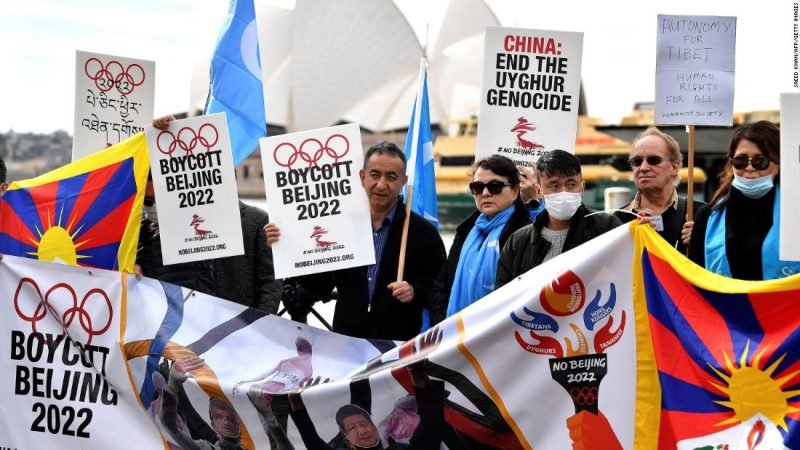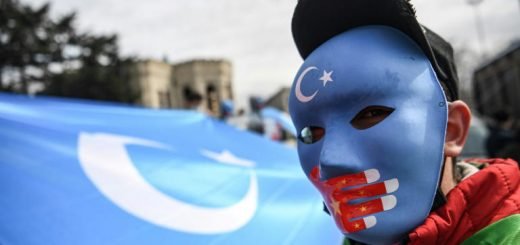Australia joins diplomatic boycott of Beijing Winter Games

Australia will join the United States in a diplomatic boycott of the Winter Olympic Games in Beijing, Prime Minister Scott Morrison said on Wednesday, as other allies weighed similar moves to protest China’s human rights record.
The United States has said its government officials will boycott February’s Beijing Olympics because of China’s human rights “atrocities”, just weeks after talks aimed at easing tense relations between the world’s two largest economies.
China said the United States would “pay the price” for its decision and warned of countermeasures in response, but gave no details.
Morrison said Wednesday’s decision came because of Australia’s struggles to re-open diplomatic channels with China to discuss alleged human rights abuses in the far western region of Xinjiang and Beijing’s moves against Australian imports.
Announcing the plans, Morrison said Beijing had not responded to several issues raised by Canberra, including the rights abuse accusations.
“So it is not surprising therefore that Australian government officials would not be going to China for those Games,” Morrison told reporters in Sydney. Australian athletes will attend.
China has denied any wrongdoing in Xinjiang and said allegations are fabricated.
Its foreign ministry spokesman Wang Wenbin said at a daily briefing in Beijing that Australian politicians were engaged in “political posturing”.
“Whether they come or not, nobody cares,” he added.
The Australian Olympic Committee said the boycott would have no impact on athletes’ preparations for the Games, which run from Feb. 4 to 20, adding that “diplomatic options” were a matter for governments.
Other U.S. allies have been slow to commit to joining the boycott.
Britain is considering approving limited government attendance at the event in the Chinese capital that would stop short of a full diplomatic boycott, the Telegraph newspaper said on Wednesday.
An outright ban on ministerial and diplomatic representation at the Winter Games remains a possibility, it added.

Japan is considering not sending cabinet members to Games after the United States announced its diplomatic boycott, the Sankei Shimbun daily said on Wednesday, citing unidentified government sources.
A South Korean presidential official said the country is currently not considering a diplomatic boycott.
President Joe Biden’s administration cited what the United States calls genocide against minority Muslims in China’s Xinjiang region. China denies all rights abuses.
The Winter Games will begin about six months after the Summer Games wrapped up in the Japanese capital of Tokyo following a year’s delay because of the COVID-19 pandemic.
“We always ask for as much respect as possible and least possible interference from the political world,” said Juan Antonio Samaranch, who heads the International Olympic Committee’s coordination panel for the Beijing event.
“We have to be reciprocal. We respect the political decisions taken by political bodies.”
The United States is set to host the 2028 Summer Olympics in Los Angeles and is preparing to bid for the 2030 Winter Olympics in Salt Lake City.
The American diplomatic boycott, encouraged for months by some members of the U.S. Congress and rights groups, comes despite an effort to stabilise the two nations’ ties, with a video meeting last month between Biden and China’s Xi Jinping.
The Only option
Unless other countries joined the boycott it would undermine the message that China’s human rights abuses are unacceptable, said Bonnie Glaser, a China expert at the German Marshall Fund of the United States.
“The only option really that is available to us is to try to get as many countries as we can to stand with us in this coalition,” Glaser told a U.S. congressional hearing on Tuesday.
Ties between Australia and its top trade partner, China, are at a low ebb after Canberra banned Huawei Technologies from its 5G broadband network in 2018 and sought an independent inquiry into the origins of COVID-19.
Beijing responded with tariffs on Australian commodities such as barley, beef, coal and wine.
Reporting by Gabriel Crossley and Renju Jose; Editing by Lincoln Feast and Clarence Fernandez.


















